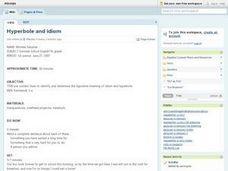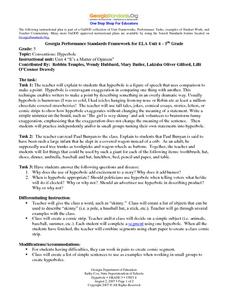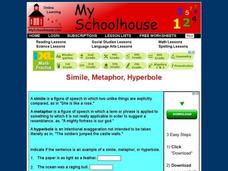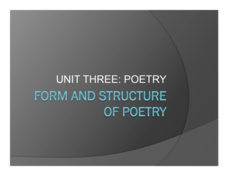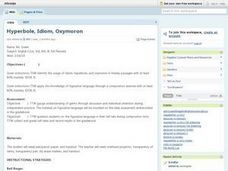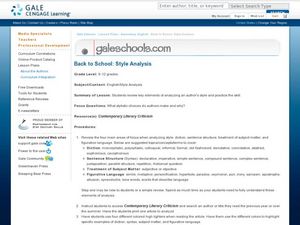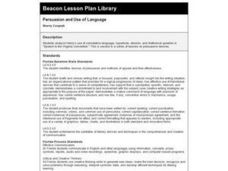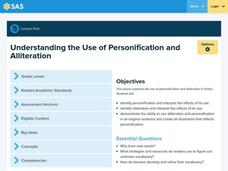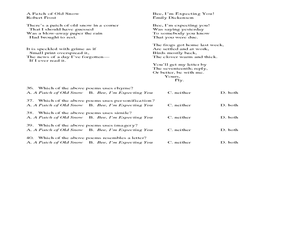Curated OER
Hyperbole and Idiom
Seventh graders use context clues to determine the figurative meaning of idioms and hyperboles. They practice writing idioms and hyperboles in sentences about real life situations around them. This lesson is a good way to improve variety...
Curated OER
The Outsiders
Tenth graders complete a variety of activities related to the first two chapters of the book The Outsiders. They define metaphor, simile, idiom, and hyperbole, and take a vocabulary pre-quiz. In small groups, they write a character...
Curated OER
Conventions: Hyperbole
Fifth graders discuss hyperbole. In this language arts instructional activity, 5th graders understand that hyperbole enables writers to make a point by describing something in an overly dramatic way. Students create a list of objects...
Curated OER
Simile, Metaphor, Hyperbole
In this online interactive figurative language worksheet, students respond to 15 fill in the blank questions identifying each sentence as a simile, metaphor, or hyperbole.
K12 Reader
Working with Figurative Language
Are your middle schoolers able to identify the literary devices featured on this worksheet? They must demonstrate their understanding of figurative language by matching the terms with their definitions and label the devices...
Deer Valley Unified School District
Close Reading: Analyzing Mood and Tone
The AP Literature and Composition exam is all about close reading. Test takers are presented with a passage and asked to analyze how an author uses literary devices to create a desired effect. Prepare your students for the exam with a...
Curated OER
Simile and Metaphor
Middle schoolers use context clues to find the figurative meaning of similes and metaphors in writing. They practice using figurative language to help their writing come alive. Use this activity in a instructional activity about poetry,...
Springfield Public Schools District 186
Form and Structure of Poetry
If anyone suffers from metrophobia—the fear of poetry—the PowerPoint on the elements of poetry may help alleviate their worries. The presentation introduces learners to poetic elements, including simile, metaphor, and personification....
Pittford Schools
Literary Devices, Techniques, and Elements
What's the difference between a speaker and an author? What's an example of anthropomorphism? Clarify the meanings of literary devices, elements, and techniques with a comprehensive glossary of terms.
Curated OER
Hyperbole, Idiom, Oxymoron
Fourth graders identify the usage of idiom, hyperbole, and oxymoron in literary passages. They apply this knowledge of figurative language through a composition exercise. The writing of teacher generated examples is also helpful.
Curated OER
"Champion of the World"
“Champion of the World,” a chapter from Maya Angelou’s I Know Why the Caged Bird Sings, is the subject of a study guide that asks readers to consider the author’s purpose, the function of the chapter in the entire narrative, and...
Curated OER
Back to School: Style Analysis
Jump back into expository writing and analysis at the start of a new school year! Start with a review of an authors' stylistic choices in diction, syntax, treatment of subject matter, and figurative language. Writers choose a text to...
Curated OER
Imagine That! Analyzing Imagery
Poems by O. Henry, Marion Dane Bauer, Monty Roberts, and Langston Hughes provide the text for a study of symbolism, hyperbole, and imagery. Employing the “think-pair-share” strategy learners generate definitions of these terms and locate...
Worksheet Web
Language – Debating
Having a debate doesn't mean you're fighting. Introduce middle schoolers to debate with a resource which distinguishes between an quarrel and a debate, describes the debate process and format, and presents some possible debate topics.
Curated OER
Persuasion and Use of Language
Students discuss connotative language, hyperbole, allusion, and rhetorical question. In small groups, they read one section of the "Speech to the Virginia Convention" and analyze these devices. Groups present their results to the class.
Curated OER
Review of Personification and Alliteration
Students study personification and alliteration in various fiction texts. In this literary devices lesson, students use various texts to identify the literary devices of personification and alliteration. Students use examples of both...
Curated OER
Exaggerations
In this exaggerations worksheet, students read several examples of exaggerations. Students are given 13 exaggerating words to use in a sentence. Two examples are given.
Curated OER
Identify Figurative Language
Your class can identify idioms, metaphosr, similes, hyperboles or personification by reading poetry and interpret meaning.
Curated OER
Poetry Unit Test
In this poetry worksheet, students complete multiple choice questions on different aspects of poetry. Students complete 40 questions total.
Curated OER
Ode to a Nightingale
Students read poems about Tuberculosis by John Keats. Using the poems, they identify similies, metaphors, personification and imagery. In groups, they make connections about the author's outlook on life and how his disease impacted his...
Curated OER
Reading Comprehension
In this reading comprehension instructional activity, students examine the meaning of twenty eight words and identify where those words might be encountered.
Curated OER
Emlyndo Word Search Puzzle
In this literacy activity, students look for the words in the puzzle that are related to the theme of the word search. The vocabulary and spelling are emphasized.
Other
My Schoolhouse: Simile, Metaphor, Hyperbole
Definitions and examples of simile, metaphor, and hyperbole followed by 15 sentences asking students to identify whether the sentence contains a simile, metaphor, or hyperbole.


